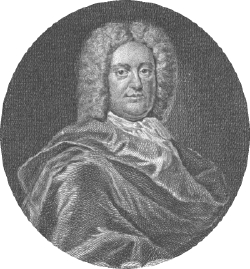
Wollaston on crimes against person or property as contradictions of fundamental truths (1722)
Found in: British Moralists vol. 2
The English philosopher William Wollaston (1660-1724) argued that violations of another person’s natural rights are not only a crime but a denial or contradiction of a fundamental truth:
Property Rights
If a body of soldiers, seeing another body approach, should fire upon them, would not this action declare that they were enemies; and if they were not enemies, would not this military language declare what was false? No, perhaps it may be said; this can only be called a mistake… Suppose then, instead of this firing, some officer to have said they were enemies, when indeed they were friends: would not that sentence affirming them to be enemies be false, notwithstanding he who spoke it was mistaken?… I lay this down then as a fundamental maxim, That whoever acts as if things were so, or not so, doth by his acts declare, that they are so, or not so; as plainly as he could by words, and with more reality. And if the things are otherwise, his acts contradict those propositions, which assert them to be as they are.